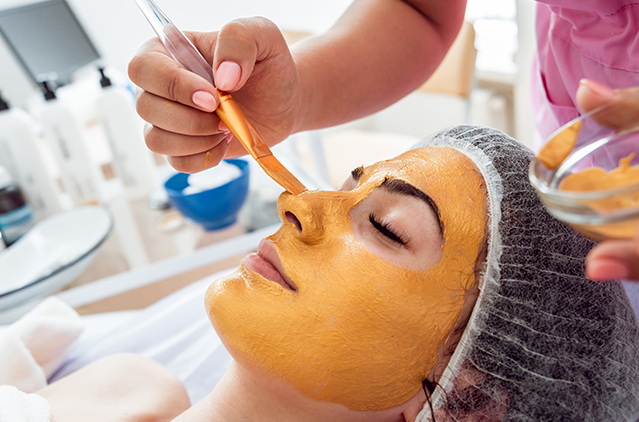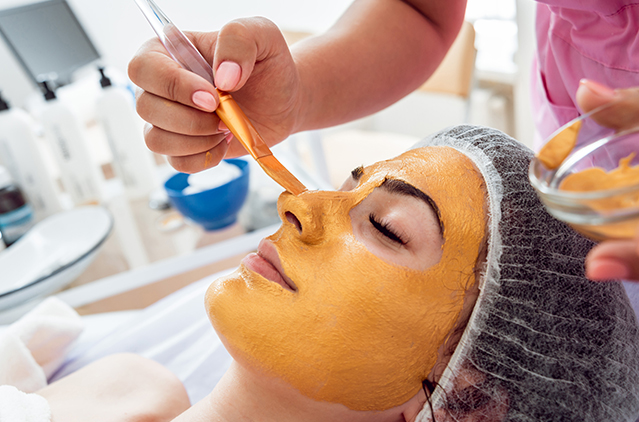
A Comprehensive Guide to Chemical Peels - Procedures, Benefits, and Costs | Kosmoderma
In medical parlance, a chemical peel, or chemexfoliation, is a skin treatment procedure where a chemical solution is applied to the skin to enhance its look.
A chemical peel is a cosmetic procedure where the outermost layers of skin are removed using a chemical solution. The acid in the solution causes sloughing of the skin by penetrating the epidermis, the top layer of your skin and the dermis, the layer beneath the epidermis. As soon as a wound appears, our body’s natural defence mechanism takes over, allowing the skin to heal itself without leaving any scars or changing colour.
When Do Dermatologists Recommend Chemical Peel?
Chemical peel is recommended by dermatologists and cosmetologists for
- Improving uneven skin texture
- Removing fine lines and wrinkles and promoting smoother, younger-looking skin
- Acne scars
- Sun damage
- Hyperpigmentation
- Collagen stimulation

Benefits Of Chemical Peeling
The benefits include-
- Freedom from fine lines and wrinkles– Chemical peels reduce the visibility of wrinkles and fine lines by increasing the production of collagen.
- Improved skin texture– Chemical peels help the skin become softer and smoother by exfoliating it.
- Even skin tone– Peels can help achieve a more even complexion by fading melasma, UV damage, and dark spots.
- Decreased visibility of acne scars- Skin– defects such as surgical scars and acne scars can be made to look better with a peel.
- Minimise pores-Chemical peeling encourages the growth of new skin, leading to tightening and reduced appearance of pores.
- Youthful glow– The glow after a chemical peeling session is due to the increased blood flow and growth of new skin cells.
- Collagen Stimulation– Chemical peels stimulate the production of collagen, a protein essential for the skin’s elasticity and youthful appearance.
Types Of Chemical Peels
Chemical peels are classified depending on the depth of the wound they create.
- Light Chemical Peel- For people with dry skin, uneven skin tone, fine wrinkles, and acne, light chemical peels are recommended. This peel can be performed every two to five weeks. Malonic, lactic, and glycolic acids and pyruvic acid with salicylic acid are commonly used. This procedure does not require anaesthesia.
- Medium Chemical peel- For people with dry skin, uneven skin tone, fine wrinkles, and acne, medium chemical peels are highly recommended. To get the desired outcome, multiple sessions are needed. Acids such as trichloroacetic acid (TCA) and glycolic acids are used for medium chemical peels.
- Deep Chemical Peel- For severe wrinkles, deep scars, and other issues, deep chemical peels are advised. Chemicals used include trichloroacetic acid (TCA) and Baker-Gordon phenol.
Procedure Of Chemical Peel
The procedure involves the application of the chemical on your face under sterilised conditions. The chemical applied depends on the type of peeling to be done. Generally, light and medium chemical peels do not need anaesthesia while deep peeling does. The solution is left on the face for some time and then washed off or neutralised. Once the procedure is done, you will be sent back home with after-care instructions. Medium and deep peeling leaves your skin with pain and burning. You will be prescribed the necessary medications to deal with it. Healing takes about 2 weeks and once done, you will be left with freshly grown skin that is smooth and even toned.
Which Chemical Peel Is Best?
The ideal chemical peel relies on the aims and concerns of each individual’s skin. Alpha hydroxy acid (AHA) and beta hydroxy acid (BHA)-containing superficial peels work wonders for light exfoliation and treating surface flaws including dullness and fine wrinkles. For milder skin conditions including hyperpigmentation and acne scars, medium-depth peels—such as those with trichloroacetic acid (TCA)—provide more noticeable outcomes. Deep peels, such as phenol peels, are only used for really serious issues such as severe UV damage and deep wrinkles. To determine the best peel for your needs and skin type, it is essential to speak with a dermatologist or skin care specialist.
How Long Does Chemical Peel Last?
The type of peel, unique skin traits, and lifestyle choices all affect how long chemical peel effects last. When combined with adequate skincare maintenance, superficial peels can produce dramatic improvements in skin tone and texture that can endure for several weeks to many months. Results with medium-depth peels are more substantial and persist longer—they frequently last six months to a year—especially when paired with a regular skincare routine and sun protection. Deep peels can yield noticeable results that persist for several years, but ageing, sun exposure, and skincare practices can all have an impact on how well they work. Chemical peel results can be prolonged with proper skin care techniques and follow-up treatments.
Cost Of Chemical Peels In India
A mild chemical peel should ideally cost between Rs 1,500 and Rs 3,500 for each session. Deep and medium treatments would be more expensive. The type of chemical peel, the intended outcome, the skin’s texture, and other variables will all affect the total cost of the procedure. It will also depend on how many sessions the dermatologist recommends.
Is Chemical Peel Good For Skin?
Applying chemical peels correctly can have a positive impact on skin health. They function by eliminating dead skin cells, encouraging cell turnover, and exfoliating the skin’s outermost layer. Many changes, including a smoother texture, more even tone, fewer wrinkles and fine lines, and a decrease in acne scars and hyperpigmentation, can be achieved with this technique. Chemical peels can also lessen acne flare-ups, clear out clogged pores, and enhance the general brightness of the skin.
Additionally, they encourage the creation of collagen, which over time results in skin that is tighter and looks younger. To reduce the chance of negative side effects, it’s essential to select the appropriate kind of peel and have the surgery done under the supervision of a licensed dermatologist or skin care specialist. Chemical peels can help create skin that is healthier and more vibrant with the right upkeep and care.



